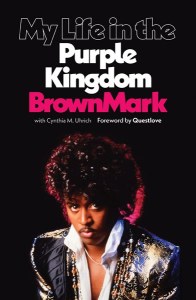 It’s a time-honoured music-biz story: The Hometown Kid Makes It Big.
It’s a time-honoured music-biz story: The Hometown Kid Makes It Big.
Or, to paraphrase Bill Bruford, first you get used to failure, then you get used to success. But BrownMark’s new memoir ‘My Life In The Purple Kingdom’, outlining his five-year stint as bassist with Prince And The Revolution, has a few intriguing twists to the old story.
Firstly, it’s a very timely work, since there’s very little documentation about the Inner Workings of the Purple Rain circus. Then there’s the added intrigue of the book mainly taking place in the huge, often-underestimated Midwestern city of Minneapolis.
The early sections are gripping, a vision of a young man flourishing as a musician, getting by in (racially and economically) difficult conditions, supported by a loving mother and extended family.
Mark documents the Minneapolis music scene of the 1970s very well, tracing his development from young Staple Singers/Ohio Players/Earth, Wind & Fire fan into local music ‘star’, with lots of talk about image creation in the era of Rick James and Controversy-era Prince (‘Only women had clothes that fit the vibe I was looking for, but I didn’t want to dress in drag’…).
Soon Prince has his number, and there’s a long, strange section on his recruitment for The Revolution (spoiler alert: hardcore Prince fans should approach the book with caution…), and a memorable account of the infamous October 1981 gig supporting The Rolling Stones in Los Angeles. There are some excellent photographs, many of which this writer had never seen, and a fine introduction by Questlove, Prince fanatic and esteemed Black Music documentarian.
But ‘My Life In The Purple Kingdom’ is also a cursory tale, a veritable How Not To Succeed In The Music Biz, and it has to be said that Mark sometimes comes across as incredibly naïve, even for a nineteen-year-old.
This speaks to something very strange at the heart of the book. There are missing details that put everything else into doubt – nothing about the status of the offer Mark received from Prince’s management upon joining The Revolution (whisked out of nowhere to join one of the most successful bands of all time, he never discusses terms and then is shocked when ‘cheated’ out of a bonus); nothing about his knowledge of Prince’s music before he joined The Revolution; barely a mention of any Prince songs or interesting musical moments during his time in the band (only Lisa Coleman and Matt Fink get cursory mentions).
The book has a ‘happy’ ending of sorts, ending with Mark’s late-‘80s solo deal with Motown Records, but bizarrely the recent (very successful) Revolution reunion isn’t mentioned. It’s almost as if he wrote it back in 1990, at the height of his bitterness and brain fog. The closing, cursory thanks to Prince almost raises the first proper laugh of the book.
But ‘My Life In The Purple Kingdom’ is an absolute must for 1999 and Purple Rain completists and those wanting to know more about the Minneapolis music scene. It’s an arresting piece of social history, often gripping and definitely original, especially in its early sections.
‘My Life In The Purple Kingdom’ by BrownMark (with Cynthia Uhrich) is published by the University Of Minnesota Press.

 Director Robert Altman once said of his classic 1992 satire ‘The Player’: ‘What we show is a very, very soft indictment of Hollywood’.
Director Robert Altman once said of his classic 1992 satire ‘The Player’: ‘What we show is a very, very soft indictment of Hollywood’. I recently got hold of Jimmy Cauty and Bill Drummond’s ‘The Manual: How To Have A Number One The Easy Way’ for a quid in my local Amnesty bookshop.
I recently got hold of Jimmy Cauty and Bill Drummond’s ‘The Manual: How To Have A Number One The Easy Way’ for a quid in my local Amnesty bookshop.